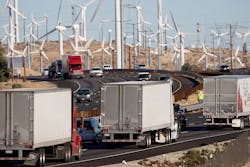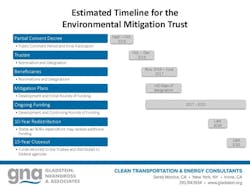What VW’s settlement means for green trucking efforts
Volkswagen’s diesel emissions cheating scandal has resulted in a $14.7-billion settlement with the U.S. government, and a potential boon for sustainable trucking efforts.
The settlement, which is set to be finalized in October, has been crafted to offset the NOx emissions from the 2L diesel vehicles sold by Volkswagen from 2009-2015. It includes $2.7 billion allocated for an Environmental Mitigation Trust focused on replacing older diesel trucks, buses and stationary equipment to reduce NOx emissions. Another $2 billion is earmarked for a Zero Emission Vehicle (ZEV) Investment Commitment, which will fund 10 years of ZEV deployments, infrastructure, and access and education programs.
A large share of the ZEV funds is expected to go towards light-duty vehicles and infrastructure, Joe Annotti, senior associate at Gladstein, Neandross & Associates (GNA), told Fleet Owner. However, he explained, there is likely to be increased focus on the use of electric vehicle technology in the medium- and heavy-duty trucking industry.
So, how can the trucking industry access some of these funds? Not directly, Annotti said, but the industry can recommend how funding programs will be designed during various public comment periods throughout the process.
Funds under the Mitigation Trust will be held by a trustee and state beneficiary, the agency designated to manage the funds from trustees, via grant programs. The plan must be posted for 30 days for public input before it’s approved.
Funds under the ZEV commitment will be distributed by the California Air Resources Board (for California funding, which has been apportioned $800 million while the rest of the U.S. will receive $1.2 billion) and the EPA for the remaining U.S. funding.
“Before the beneficiaries release funding, there will be a public comment period, which the trucking industry should take advantage of in order to request increased funding levels for clean diesel and alternative fuel projects,” Annotti said.
Annotti said ports, fleets and engine makers that do business with the federal government and municipal organizers are likely to receive the greatest benefit as the Environmental Mitigation Trust will fund 100% of the new vehicle purchase (regardless of fuel type) if the vehicle is government owned. Ports poised to benefit most are those that operate in populations most affected by diesel pollution –Ports of Los Angeles and Long Beach, Port of New York and New Jersey, and the Port of Oakland.
“It is imperative then that federal and state agencies coordinate with the trucking industry and other key external stakeholders to ensure that funds are distributed to those projects capable of reducing the most NOx emissions in the most cost-effective ways,” Annotti explained.
Annotti suggests that moving forward trucking companies pursue working with stakeholder organizations like GNA, CARB, Clean Cities Coalition, and natural gas and other alternative fuel organizations that could submit mitigation plan recommendations and advocate for fleets.
“Look into where your fleet wants to go,” he said. “Working with those organizations represents a really outstanding opportunity for advancing your goals and getting buy-in from state agencies. It’s difficult [for these agencies] to listen to one or two people, but listening to a whole coalition carries a lot of weight. There are a lot of entities out there that can support getting in front of these state agencies.”
About the Author

Cristina Commendatore
Cristina Commendatore is a past FleetOwner editor-in-chief. She wrote for the publication from 2015 to 2023.

